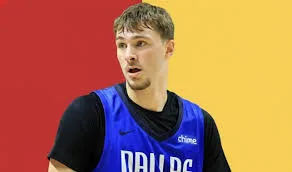Cooper Flagg’s breakout rookie season hit a speed bump Monday night as his injury-depleted Dallas Mavericks fell 119-101 to Anthony Edwards and the Minnesota Timberwolves at Target Center. Despite another solid performance from the top draft pick, the Mavericks couldn’t overcome the absence of three key players on the second night of a back-to-back.
Table of Contents
Mavericks Game Summary: November 17, 2025
| Category | Details |
|---|---|
| Final Score | Timberwolves 119, Mavericks 101 |
| Flagg Stats | 15 points, 6-of-10 FG, 1-of-2 3PT, 2-of-2 FT |
| Edwards Stats | 13 points, 5-of-14 FG (Quiet night) |
| Mavericks Record | 4-10 (1-2 in back-to-backs) |
| Timberwolves Record | 9-5 |
| Key Absences | Anthony Davis, Daniel Gafford, Dereck Lively II |
Cooper Flagg’s Performance Breakdown

First Half Struggles
Flagg opened with a solid start, scoring six points on 2-of-4 shooting including 1-of-1 from three-point range through the first two quarters. However, the rookie looked frustrated at halftime after managing just one rebound in 16 minutes of play.
Third Quarter Surge
The Maine native found his rhythm in the third quarter, knocking down all three field goal attempts to push his tally to 13 points. Unfortunately, Minnesota dominated the period 37-22, effectively putting the game out of reach despite Flagg’s efficiency.
Final Line: Steady Despite the Loss
Flagg finished with 15 points alongside Brandon Williams, who also scored 15 for Dallas. His 60% shooting from the field demonstrated continued growth, even as the Mavericks’ depleted roster struggled to keep pace with Minnesota’s balanced attack.
The Injury Crisis Continues
The Mavericks were without two key big men—Daniel Gafford sat out with an ankle injury while Dereck Lively II was held out for knee injury management on the second night of a back-to-back. Anthony Davis also remains sidelined, giving rookie Moussa Cissé his first career start.
This injury situation has placed enormous pressure on Flagg to carry the offensive load. He’s averaging 15.6 points, 6.7 rebounds, and 3.2 assists per game this season while shooting 44.7% from the field—impressive numbers for a rookie thrust into a starting role immediately.

Timberwolves’ Balanced Attack
While Edwards had an uncharacteristically quiet night, Jaden McDaniels and Rudy Gobert each scored 15 points to lead Minnesota. Julius Randle added another efficient performance as the Timberwolves improved to 9-5, solidifying their position among the Western Conference’s top teams.
What This Means for Dallas
The Mavericks now enter one of their toughest stretches—five games in seven days—while still missing their top three centers and primary ball-handlers. Flagg’s development remains the silver lining in an otherwise difficult season start.
Despite the loss, the Newport native continues proving he belongs at the NBA level. His halftime conversation with Gafford during Sunday’s game helped him turn around his performance, showing maturity beyond his years in handling adversity.
For more NBA coverage and Dallas Mavericks analysis, visit TechnoSports and check out our basketball section for comprehensive game recaps and player profiles.
Looking Ahead
Dallas returns home Wednesday to begin a three-game homestand against Jalen Brunson and the New York Knicks. The question remains: can the Mavericks get healthy enough to compete, or will Flagg continue shouldering the burden as a rookie?
The schedule doesn’t get easier, but Flagg has shown he’s ready for the challenge. His consistent performances despite the team’s struggles have established him as a legitimate building block for Dallas’s future.
Stay updated with the latest NBA action at the official NBA website and follow TechnoSports for instant game updates, player stats, and exclusive basketball content.
FAQs
Q: How has Cooper Flagg performed since moving away from the point guard role?
Flagg has thrived since Dallas adjusted his role. In his last seven games before the Timberwolves matchup, he averaged 17.6 points, 7.1 rebounds, and 3.1 assists while shooting an impressive 49.5% from the floor. The coaching staff initially tried him at point guard due to roster limitations, but he’s performed much better as a secondary playmaker—similar to a Grant Hill-type role where he can make plays without the primary ball-handling responsibilities. His recent stretch, including a 21-point performance against Portland, shows he’s adjusting well to NBA speed and physicality.
Q: Why did Anthony Edwards have such a quiet game despite being the Timberwolves’ leading scorer?
Edwards’s 13 points on 5-of-14 shooting represented an off night by his standards—he’s averaging 27.3 points per game on 47.6% shooting this season. However, Minnesota didn’t need his typical scoring explosion because they got balanced contributions across the roster. Jaden McDaniels and Rudy Gobert each scored 15 points, while Julius Randle continued his efficient play. When teams have multiple scoring threats like Minnesota does, star players can have quiet nights while still securing comfortable victories. The Timberwolves’ 37-point third quarter effectively sealed the game regardless of Edwards’s individual performance.








